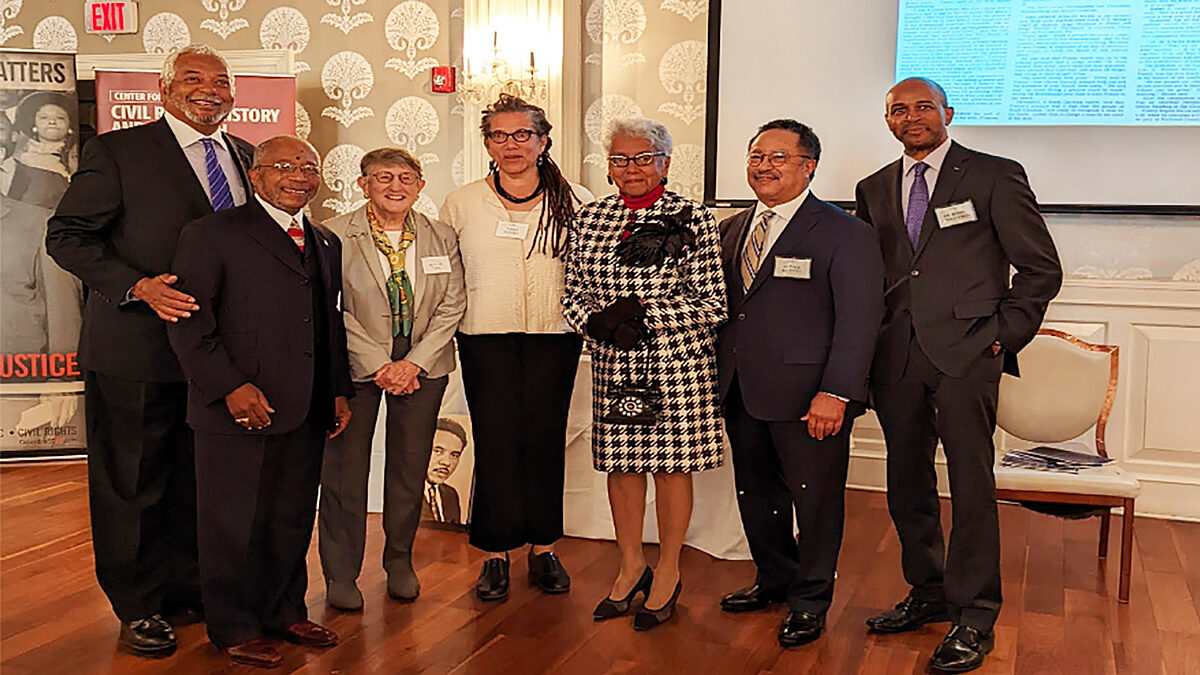
UMCSC pastor participates in Finney commemoration event
By Dr. J. Elbert Wiliams
On April 27, at the invitation of the Finney family, I attended the South Carolina Supreme Court Historical Society’s Annual Meeting. There, the life and legacy of Chief Justice Ernest A. Finney, former chief justice of the South Carolina Supreme Court, was honored.
Special presentations on Finney’s career were made by Luther Battiste, founding shareholder of Johnson, Toal & Battiste, PA, and Dr. Bobby Donaldson, director of the Center for Civil Rights History and Research at the University of South Carolina, as well as the Hon. Jean H. Toal, former chief justice of the South Carolina Supreme Court.
Finney was born March 23, 1931, in Smithfield, Virginia, to Dr. Ernest Adolphus Finney Sr. and Collen Godwin Finney, who died 10 days after he was born. He earned a B.A. degree from Claflin College, Orangeburg, in 1952. He was then enrolled in South Carolina State College’s School of Law, from which he graduated in 1954, and in the same year, he was admitted to practice law and hold membership in the South Carolina Bar. He died Dec. 3, 2017.
Initially, he followed in his father’s footsteps and worked as a teacher in Conway for more than five years. In 1960, he moved to Sumter and began his full-time law practice, specializing in civil rights advocacy and defense. In 1961, he defended nine black college students from Friendship College in Rock Hill who were arrested after staging a sit-in at the segregated McCrory’s five-and-dime lunch counter.
During his career, he would go on to defend several thousand civil rights cases alongside his good friends and brothers Matthew Perry and Lincoln Jenkins. He would go on to lose most of his first rounds in the South Carolina trial courts, but eventually win all but two on appeal. In 1963, he was appointed chairman of the Advisory Commission on Civil Rights.
Finney was elected to represent Sumter County (and part of Sumter County after the House of Representatives were re-appointed in 1973) in the 100th General Assembly of the S.C. House of Representatives that met from 1972-1975. The four years he spent in the South Carolina House of Representatives were historic. He was the first African American to preside as Speaker Pro Tempore. He was a vocal and ardent opponent of the death penalty. He led a critical re-apportionment charge for fair and equitable voting rights. He was a charter member of the Legislative Black Caucus and served as its chairman from 1972-1975.
Ramon Schwartz, speaker of the House, said, “I know of no man who has come to the halls of the General Assembly who was more quickly accepted or respected.”
On July 22, 1976, Finney was elected Circuit Court Judge on the 3rd Judicial Circuit, becoming South Carolina’s first African-American circuit court judge since the 1870s, when federal troops were finally withdrawn from the former confederacy. In 1985, he was elected as an associate justice on the South Carolina Supreme Court, replacing Julius B. Ness, who had been elected chief justice. He became the first African American to sit in the state’s highest court in the 20th century.
On May 11, 1994, 42 years after becoming a lawyer in the state that had separate laws for African Americans, Finney was elected chief justice of the South Carolina Supreme Court, becoming the first African American to serve as chief justice in the state’s history. He served as chief justice until March 23, 2003, when he retired on his 69th birthday.
In 2002, he accepted one more call to duty. He returned to Orangeburg to accept the position of interim president of his alma mater, South Carolina State University, where he agreed to steer the school during its search for a new leader. In a career spanning six decades, Finney never lost faith that “the law works” and he always remembered the great enduring sacrifice of his mother. He was quick to say, “I feel a necessity to try to do a little more with my life than I might have otherwise to justify my existence.”
This was for me one of the greatest honors of a lifetime.
Williams pastors the Lamar-Ebenezer Charge.